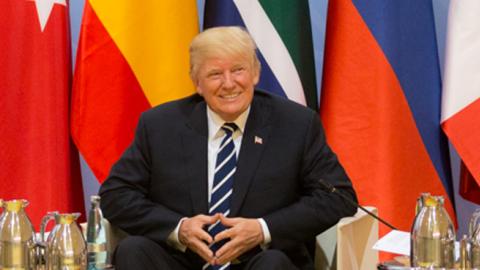Forget the tweets, the gaffes and the undiplomatic asides. The most trenchant criticism of President Trump’s foreign policy is that it risks forfeiting America’s hard-won position of global leadership.
It’s a compelling indictment: Mr. Trump is withdrawing from the Paris Accord, “restructuring” the State Department with a chain saw, dumping the Pacific trade deal, and abdicating on human rights while cozying up to authoritarians. The whole of the damage being done to America’s standing is greater than the sum of his tweets.
On the other hand, those hardy souls who defend the administration argue Mr. Trump is so smart that his critics can’t fathom the method to his apparent madness. The naysayers, as this theory has it, are playing checkers, while Mr. Trump is winning at chess.
The truth, as always, is more complicated. Mr. Trump is not the second coming of Bismarck, and his temperament, education and experience have not prepared him to steer American foreign policy at a difficult time. But there is a pattern if not a method to his moves. Moreover, Mr. Trump’s mix of ideas, instincts and impulses is not as ill-suited to the country’s needs as his most fervid detractors believe.
What gives Mr. Trump his opening is something many foreign-policy experts have yet to grasp: that America’s post-Cold War national strategy has run out of gas. During the period of confidence and giddy optimism that followed the Soviet Union’s fall, the list of “important” American foreign-policy goals expanded dramatically.
Promoting democracy in the Middle East; protecting the rights of religious and sexual minorities; building successful states from Niger to Ukraine; advancing global gender equality; fighting climate change: This is only a partial list of objectives recent administrations pursued, sometimes under pressure from congressional mandates. Foreign policy has become as complex and unwieldy as the tax code, even as public support for this vast, misshapen edifice has withered.
Change had to come, and the failure of Mr. Trump’s 2016 rivals—both Republican and Democratic—to offer a less disruptive alternative to gassy globalism helped put him in the White House. Although the president’s antiglobalist and mercantilist instincts blind him to some realities, they enable him to grasp three significant truths.
First, Mr. Trump knows that the post-Cold War policies can no longer be politically sustained. Second, he knows that China poses a new and dangerous challenge to American interests. Third, he sees that foreign policy must change in response. The old approach—on everything from trade and development, to military deployments and readiness, to religious freedom and women’s issues—must be reassessed in the light of today’s dangerous world.
For years foreign-policy thinking was dominated by the idea that the end of the Cold War meant the “end of history”—the inevitable triumph of the so-called liberal world order. This belief shaped a generation of intellectuals and practitioners.
But history isn’t over, and American foreign policy needs to come back to earth. The U.S. isn’t putting the finishing touches on a peaceful global system that is fated to endure for the ages. For the foreseeable future, foreign policy is going to be less about making dreams come true and more about keeping nightmares at bay.
Mr. Trump’s critics retort that committing to advance human rights and fight climate change wraps American power in a mantle of legitimacy and promotes cooperation from allies. The costs for failure in these areas will only grow. Moreover, some of Mr. Trump’s moves, like walking away from the Pacific trade deal, strengthen China at America’s expense.
Fair enough. American foreign policy must ultimately stand for something greater than itself. If FDR could proclaim the Four Freedoms in the depths of World War II, then a president today should be able to articulate a larger goal than “MAGA.” Mr. Trump does not appear to understand the importance of trade policy to building alliances and, therefore, American security. One can add that American security rests in large part on whether other countries believe they can count on Washington’s word. Erratic tweets and impulsive flights of rhetoric undercut that confidence.
In steering American foreign policy away from the inflated expectations and unrealistic objectives produced by the end of history mirage, the Trump administration is performing a much-needed service. But it is not enough to demolish the old. Ultimately Mr. Trump will be judged on his ability—or failure—to build something better.


















